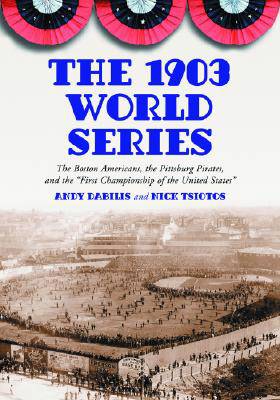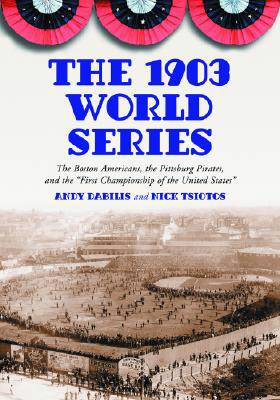
- Retrait gratuit dans votre magasin Club
- 7.000.000 titres dans notre catalogue
- Payer en toute sécurité
- Toujours un magasin près de chez vous
- Retrait gratuit dans votre magasin Club
- 7.000.0000 titres dans notre catalogue
- Payer en toute sécurité
- Toujours un magasin près de chez vous
The 1903 World Series
The Boston Americans, the Pittsburg Pirates, and the First Championship of the United States
Andy Dabilis, Nick TsiotosDescription
The first World Series was a best-of-nine series between the Boston Americans and the Pittsburg Pirates, with the first three games to be played in Boston starting at the Huntington Avenue Grounds on October 1, 1903. The series started with baseball's winningest pitcher, Cy Young, throwing the first pitch, and ended with baseball's greatest hitter, Honus Wagner, striking out on the last pitch. Boston won the series, five games to three.
Each game of the 1903 World Series and its key plays and players are thoroughly covered here, and the authors also pay special attention to the great significance that first World Series held for the future of baseball. Not only was the survival of the American League at stake, but baseball's place as the preeminent sport in America. The 1903 World Series drew more than 100,000 people to the ballparks, and there was no doubt about the popularity of the game. It was, as the authors point out, played by men, who, had they not been baseball players, would have been among the working class that made up most of the audience.
Spécifications
Parties prenantes
- Auteur(s) :
- Editeur:
Contenu
- Nombre de pages :
- 218
- Langue:
- Anglais
Caractéristiques
- EAN:
- 9780786418404
- Date de parution :
- 01-09-04
- Format:
- Livre broché
- Format numérique:
- Trade paperback (VS)
- Dimensions :
- 153 mm x 231 mm
- Poids :
- 326 g

Les avis
Nous publions uniquement les avis qui respectent les conditions requises. Consultez nos conditions pour les avis.






